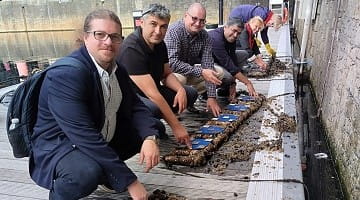About this course
Qualify for a career in fertility treatment and reproductive research on this new Clinical Embryology MSc, designed and run in conjunction with industry.
- Study on this Clinical Embryology MSc, which is jointly taught by LJMU and CARE Fertility
- The course is the only fully integrated UK clinical embryology masters taught with fertility treatment providers
- Learn from academic, research-active staff at LJMU and clinical embryology and reproductive medicine specialists at CARE Fertility
- Focuses on practical experiences and current advances in fertility research
- Provides a strong practical and academic foundation and knowledge base to prepare you for a career in assisted reproduction
- Develop an in-depth understanding of current technologies relevant to the fertility treatment sector
- Benefit from teaching in state-of-the-art facilities at LJMU and CARE Fertility
The MSc Clinical Embryology programme has been designed to provide a comprehensive understanding of assisted reproductive technologies. You will have access to specialist, state-of-the-art laboratories at both LJMU and CARE Fertility Manchester and will receive training in relevant new technologies. CARE Fertility's dedicated training laboratory features four fully-equipped zones for hands-on practical work and expert demonstrations. Each zone has a microscope, laser and micromanipulator with access to IVF incubators and consumables. There is also a dedicated area with audio-visual tools for teaching, discussion and study with live-link video to the on-site clinical IVF laboratory.
The curriculum is research-led and the latest advances will be explored in student-focused seminars. Upon graduation, you will have a competitive edge in the fertility treatment jobs market. Please note that this degree does not lead to state registration as a Clinical Scientist. If you require further careers advice on the route to becoming an embryologist/andrologist, please contact: scienceadmissions@ljmu.ac.uk for more information.
Course modules
Discover the building blocks of your programme
Further guidance on modules
Modules are designated core or optional in accordance with professional body requirements, as applicable, and LJMU’s Academic Framework Regulations. Whilst you are required to study core modules, optional modules provide you with an element of choice. Their availability may vary and will be subject to meeting minimum student numbers.
Where changes to modules are necessary these will be communicated as appropriate.
Core modules
Research Methods
20 credits
20 credits
The aim of this module is to equip you with the necessary skills to effectively search for information, critically appraise and analyse data, report scientific data and communicate research findings.
Embryology
20 credits
20 credits
All lectures in this module will be covered by experts in their respective fields who will introduce the basic principles of embryology.
Assisted Reproduction Technologies I
20 credits
20 credits
Provides postgraduate level knowledge and understanding of fundamental concepts and issues involved in Assisted Reproductive Technology (ART), at both a scientific and clinical level.
Genetics
20 credits
20 credits
Aims to develop a reflective understanding of the genetic basis of disease and its investigation.
Assisted Reproductive Technologies II
20 credits
20 credits
Provides you with increasing understanding of infertility and assisted reproductive technologies (ART), with more emphasis on clinical aspects than in the ART I module. The module also has a focus on drug regiments and clinical management.
Advanced Laboratory Skills
20 credits
20 credits
Provides an understanding of cell culture as a technological component of aspects of biological research and commercial exploitation.
Research Project
60 credits
60 credits
Provides you with the opportunity to conduct independent, in-depth research in an assisted reproductive technologies topic.
Professional accreditation/links
MSc Clinical Embryology is jointly taught by LJMU and CARE Fertility.

Your Learning Experience
An insight into teaching on your course
Study hours
The 20 credit modules have on average 37 hours contact. Three modules will be delivered in semester 1, three modules in semester 2 and the 60-credit research project will be conducted from May to August. Generally, there are three contact days in semesters 1 and 2. The project will be conducted Monday to Friday for four months.
Teaching methods
Course content is delivered via a combination of lectures, practicals, workshops, seminars, tutorials, student-centred activities and independent research.
Applied learning
There may be the opportunity for some students to conduct their research project at CARE Fertility, however this is dependent upon availability of places offered by industrial partners and competition at interview for places.
How learning is monitored on your programme
To cater for the wide-ranging content of our courses and the varied learning preferences of our students, we offer a range of assessment methods on each programme.
On this programme you will be assessed via a combination of examinations, practical reports, oral presentations, critical literature reviews, portfolios, project reports and oral defences.
Where you will study
What you can expect from your School
You will have access to specialist, state-of-the-art laboratories at LJMU and CARE Fertility. At LJMU you will study at our Byrom Street site in the university's City Campus. The Life Science Building offers state-of-the-art research facilities to ensure we can underpin all of our postgraduate studies with impactful, public-focused research activities.
Course tutors

Dr Giles Watts
- Programme Leader
I enjoy supporting students as they grow and develop into confident independent scientists
I enjoy supporting students as they grow and develop into confident independent scientists
Dr Giles Watts has worked as a Senior Lecturer in Genetics at LJMU for six years and teaches genetics and molecular biology to undergraduate and postgraduate students. Giles obtain his degree in Genetics from the University of Leeds, followed by a PhD in Cancer Genetics from the University of Birmingham. He previously completed a Post-Doctoral Fellowship at the University of Washington, Seattle and worked as an Instructor in Genetics, Children’s Hospital, Boston and as a Lecturer in Cell and Molecular Genetics at Norwich Medical School. He is a member of LJMU’s Biomedical Science research group and conducts research into functional genomics and microbiomes.
-
 Lecturer/Senior Lecturer
Lecturer/Senior Lecturer -
 Lecturer/Senior Lecturer
Lecturer/Senior Lecturer
Career paths
Further your career prospects
LJMU has an excellent employability record with 96% (HESA 2018) of our postgraduates in work or further study six months after graduation. Our applied learning techniques and strong industry connections ensure our students are fully prepared for the workplace on graduation and understand how to apply their knowledge in a real world context.
This degree provides a strong practical and academic foundation and knowledge base to facilitate a career in assisted reproduction. There is also the option to progress your academic studies by completing a PhD in this field. It is expected that some of the output from the programme could help towards graduates seeking State Registration as a Clinical Scientist.
Tuition fees and funding
- Home full-time per year:
- £18,000
The University reserves the right to increase tuition fees in accordance with any changes to the maximum allowable fees set by the UK Parliament. In the event of such a change, any fee increase will be subject to a maximum cap of 10% of the total course cost as originally stated at the time of your offer.
Fees
The fees quoted at the top of this page cover registration, tuition, supervision, assessment and examinations as well as:
- library membership with access to printed, multimedia and digital resources
- access to programme-appropriate software
- library and student IT support
- free on-campus wifi via eduroam
Additional costs
Although not all of the following are compulsory/relevant, you should keep in mind the costs of:
- accommodation and living expenditure
- books (should you wish to have your own copies)
- printing, photocopying and stationery
- PC/laptop (should you prefer to purchase your own for independent study and online learning activities)
- mobile phone/tablet (to access online services)
- field trips (travel and activity costs)
- placements (travel expenses and living costs)
- student visas (international students only)
- study abroad opportunities (travel costs, accommodation, visas and immunisations)
- academic conferences (travel costs)
- professional-body membership
- graduation (gown hire etc)
Funding
There are many ways to fund postgraduate study for home and international students. From loans to International Scholarships and subject-specific funding, you’ll find all of the information you need on our specialist postgraduate funding pages.
Please be aware that the UK’s departure from the EU may affect your tuition fees. Learn more about your fee status and which tuition fees are relevant to you.
- International full-time per year:
- £30,000
International Scholarships and payment plans
Liverpool John Moores University is committed to supporting international students by providing a range of scholarships and flexible payment plans to help students manage their tuition fees.
Scholarships
LJMU provides a variety of scholarships to support international students. Scholarships are available to self-funded students who have accepted their offer and met all the conditions outlined in their offer letter. Students must also demonstrate that they can cover living costs, travel, and other expenses associated to studying at the university. Postgraduate scholarships include tuition fee reductions and are often offered in partnership with external funding organisations.
All self-funded international students are eligible for an automatic scholarship worth up to £4,000. For more details and to view our full list of scholarships, visit the international scholarship webpages.
Deposit
All students must pay a £5,000 deposit before they can receive their CAS letter.
For more information view our deposit page.
Tuition Fee Payment Plan
After paying their £5,000 deposit, students have the option to pay their fees in full or in three equal instalments minus any internal scholarships and discounts. There are two payment options available for international students. You can either pay your tuition fees in full before enrolment or opt for a payment plan. With the payment plan, you can pay your fees in three instalments after making your £5,000 deposit. The first instalment is due before enrolment.
All payments should be made through Flywire. Full details can be found in the How to Pay Guide.
Early Bird Tuition Fee discount
We are excited to introduce a £500 Early Payment Discount to all self-funded international students. Eligible self-funded students who pay their fees by the required deadlines will get a discount which will be automatically deducted from the 1st year of tuition fees.
To see the required deadlines please visit the webpage
All international applications for this programme must be submitted by Friday 16 May 2025. Applicants who are successful and receive a ‘conditional’ or ‘unconditional’ offer onto the programme will have until Friday 30 May 2025 to accept and pay a pre-CAS deposit of £5,000. This is due to the limited number of places available.
If you have any questions regarding this timeline, please get in touch with the international team on: international@ljmu.ac.uk or international admissions on: internationaladmissions@ljmu.ac.uk
Entry requirements
You will need:
Qualification requirements
Undergraduate degree
- a minimum 2.1 honours degree in Biological Science or another related biological sciences degree
or:
- alternative qualifications with significant work experience
International requirements
Other international requirements
- An international qualification that equates to UK requirements. International students must also have an English language qualification equivalent to at least IELTS 6.5 (a minimum of 6.0 is required in all components) as recognized by LJMU.
How to apply
Securing your place at LJMU
To apply for this programme, you are required to complete an LJMU online application form. You will need to provide details of previous qualifications and a personal statement outlining why you wish to study this programme.
Your university life
From accommodation and academic support to clubs and societies. Find out what LJMU has to offer.
Related Links
Talk to our students
Connect with a current LJMU student for advice and guidance on university life, courses and more.
See what our students are saying
At LJMU we want you to know you’re making the right choice by studying with us. You can see what our students are saying about their experience with us through their reviews on the following websites:
Related Links
News and views
Browse through the latest news and stories from the university










The University reserves the right to withdraw or make alterations to a course and facilities if necessary; this may be because such changes are deemed to be beneficial to students, are minor in nature and unlikely to impact negatively upon students or become necessary due to circumstances beyond the control of the University. Where this does happen, the University operates a policy of consultation, advice and support to all enrolled students affected by the proposed change to their course or module.


















